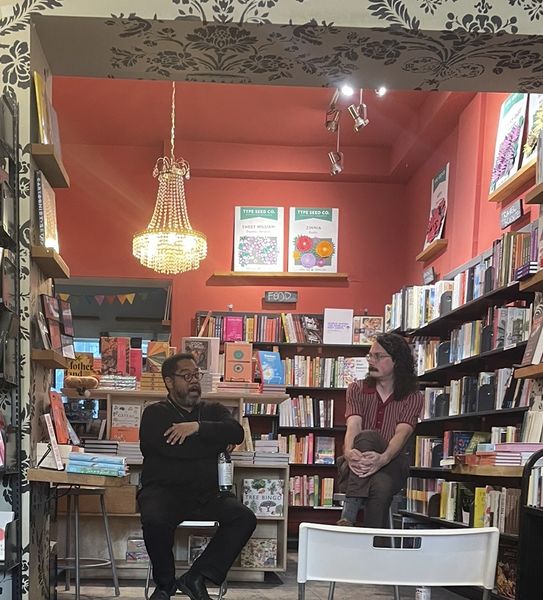Bringing It All Back Home
By Geoffrey Morrison
As I write this, I am sitting outside in the backyard of a rowhouse in Toronto’s East End. The wind is stirring the leaves of a big maple tree spreading its branches high above me, and stirring the leaves of other maples, and the leaves of yet other trees whose names I don’t know. They make a sound like the whoosh of the ocean in miniature. I am an ocean person at heart – I was born on the BC coast, and that’s where I live now, too – so the little ocean of these landlocked leaves is a kind of conduit between there and here, now and then, today and tomorrow. I have been in Toronto since Saturday morning, and I fly back home to Vancouver tonight – my visit has not even been long enough for my sleep schedule to adjust, or for me to stop saying “here” when I mean “Vancouver.” It is all very surreal, especially because, once upon a time, the East End of Toronto really was my “here.”
My wife and I lived at Danforth and Woodbine from 2014 to 2016, years when I began a PhD program, walked picket lines as a striking teaching assistant for CUPE 3902 (“Three! Nine! Oh! Two! We do more work for less than you!”), abandoned said PhD program after one year (for reasons too tedious to rehearse that basically had to do with mental health and with the existential question of whether I really wanted that life for myself), found work in an office proofreading grammar textbooks, volunteered for the litmag The Ex-Puritan, and moved back to BC with the vague but at the time still very uncertain hope that I would finally get my head straight and figure out this writing thing. To have come back now under the circumstances I have is still basically unbelievable to me and would have caused the person I was in 2016 to do some combination of laugh, cry, and throw up.
I was here this weekend to be on a panel for Word on the Street (“Genrebending and Liminal Fiction” with Corinna Chong and A.G. Pasquella, and hosted by Sonia Urlando) and to read and speak with my editor, André Alexis, at Type Books. Everyone was lovely and I had a wonderful time. I met people in person I had previously only known as Twitter friends, or names on book jackets, or faces on the other end of Zoom calls. I saw many friends from my Ontario days, some of whom I hadn’t seen in years. I walked old haunts, ate old beloved gyros. I even made it to Sneaky Dee’s, which I had heard somewhere was closing last year and so I assumed was already gone. Seeing that neon light beckoning across the corner of College and Bathurst was perhaps the most miraculous moment of a trip that was full of serendipities.
Back in 2014, I had gone to Word on the Street in Queen’s Park and been awed by all those publishers I had heard so much about. It all felt very far away from me at the time. I knew I wanted to write, but I had no idea how I would ever convince any of these people to pick up something of mine, not least because I hardly had anything to give them, then. Because I was in the Book History program at U of T for my PhD, I had gone on a tour of Coach House Books, seen the offset presses in operation, looked at the old linotype machine and platen press…once again as an awed observer of things it seemed impossible for me to take part in. To come back this time and see those offset presses again and know that, actually, my own book had come into the world by their means, was a feeling I have still not fully processed. It all feels made up. My final year in Toronto, I read André Alexis’s Fifteen Dogs. This is a book that is so richly situated in Toronto as a place, and as I read it, already knowing I would be leaving, I felt a powerful and melancholy tenderness for this city I had tried to live in but which I had never quite managed to get a hold on. As I said before, I am an ocean person, and I say this even though I can’t swim, don’t fish, and have never driven a boat. There’s just something about the sea air of Vancouver that comforts me, and whenever I am away from it I start to dry out, like a starfish. (This weekend my lips have been chapped to hell and I’ve been hydrating like crazy). But reading Fifteen Dogs I saw Toronto through the eyes of someone who truly knows it, and so I felt I was saying goodbye in the right way. I also came away with a huge admiration for the mind that had created the book. If you told 2016-me that we would later spend weeks working together on edits over Zoom, a process that I will always remember as being full of laughter and good feelings, or that we would some day get to meet in person and compare notes about the best place to get a margarita in Vancouver, I would, once again, scream, cry, throw up, etc.
Final serendipity: I discovered Type Books near the end of my time in Toronto. On a brief return visit in 2017, I think when I was on the way to see friends at MUTEK in Montreal, I went in and wanted to know if they had this Eugene Lim book I’d heard about called Dear Cyborgs. They did. I read it, and was thrilled to discover a writer who was emphatically not concerned with following all those rigid strictures of the Novel, Narrowly Defined. In an interview he said:
Your CanLit News
Subscribe to Open Book’s newsletter to get local book events, literary content, writing tips, and more in your inbox
“One thing I would like to do — and perhaps Dear Cyborgs does a little of this — is to approach the novel without the locus of character as its main technology. I’d like to describe the chaotic matrix in which we’re living through some other narrative device, some new way that supersedes our dependence on character as empathy avatar and our traditional use of plot as an arc about conflict resolution, and furthermore a method that accounts for the intense mind-boggling complexity we live in that somehow must be apprehended by our puny individual minds. In Dear Cyborgs, the method I tried was a kind of monologue-fractal, which is why all the characters in the book may seem empty or unrealistic, and yet their speeches seem familiar and hopefully poignant and/or meaningful.”
Lim was one of the first contemporary writers I’d encountered who thought this way, and his example helped me to see that I might just be able to write something that also moved away from plot and character as we tend to understand them. Everything I was saying to you in my previous posts about voice, about class, about the forms that came before the novel and will come after, was greatly inspired by Lim’s example. That I was able to return to Type as an author and read from a book that owes so much to a book I found on its shelves is, well, it’s nuts. There’s no other way of putting it.
The leaves are still fluttering outside. I will have to leave for my plane soon. I want to thank those of you who have followed me this far, and the good people at Open Book for giving me this opportunity to write to you all this way, and the city of Toronto for letting me exchange my blue ocean for its green one this weekend. As always when it is time to say goodbye, I want to say more but I don’t know what. So, uh, well. Let us hope we meet again sooner rather than later. As my mother would always say growing up whenever we got to do anything nice, "It's back to porridge an' aul claes the morn."
The views expressed in the Writer-in-Residence blogs are those held by the authors and do not necessarily reflect the views of Open Book.
Geoffrey D. Morrison is the author of the poetry chapbook Blood-Brain Barrier (Frog Hollow Press, 2019) and co-author, with Matthew Tomkinson, of the experimental short fiction collection Archaic Torso of Gumby (Gordon Hill Press, 2020). He was a finalist in both the poetry and fiction categories of the 2020 Malahat Review Open Season Awards and a nominee for the 2020 Journey Prize. He lives on unceded Squamish, Musqueam, and Tsleil-Waututh territory (Vancouver). Falling Hour is his first novel.





